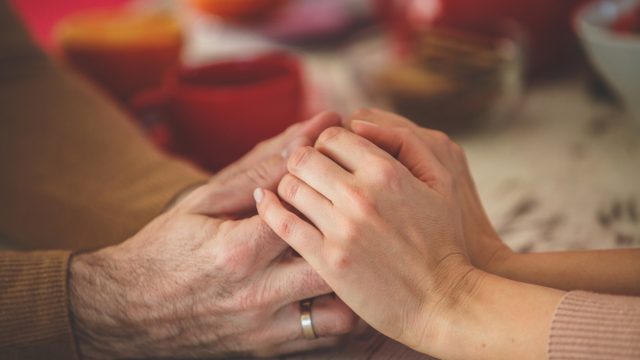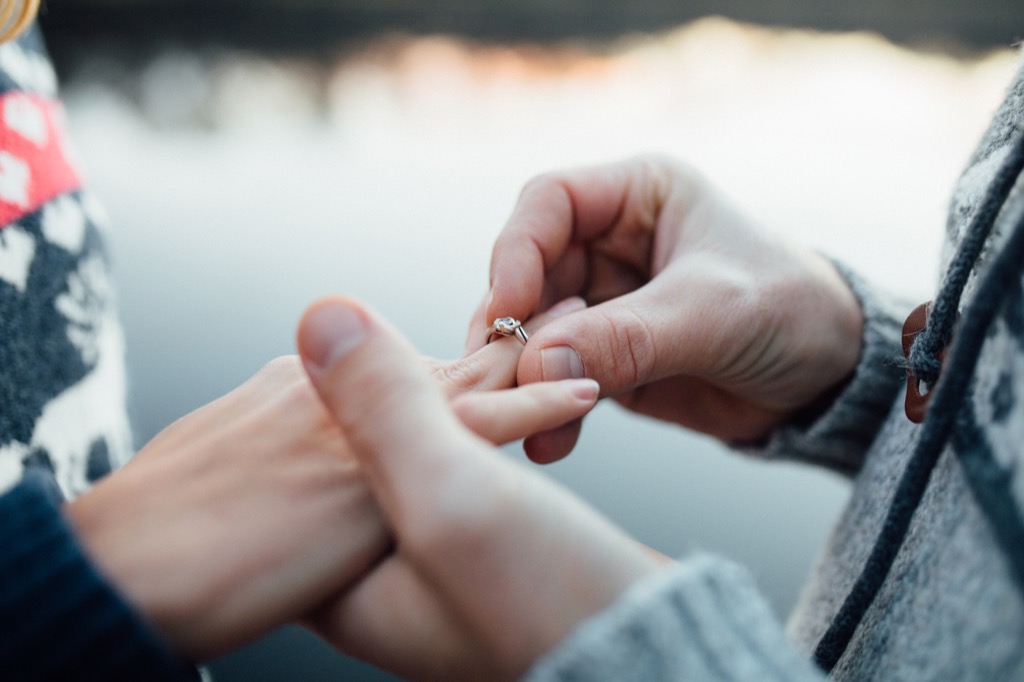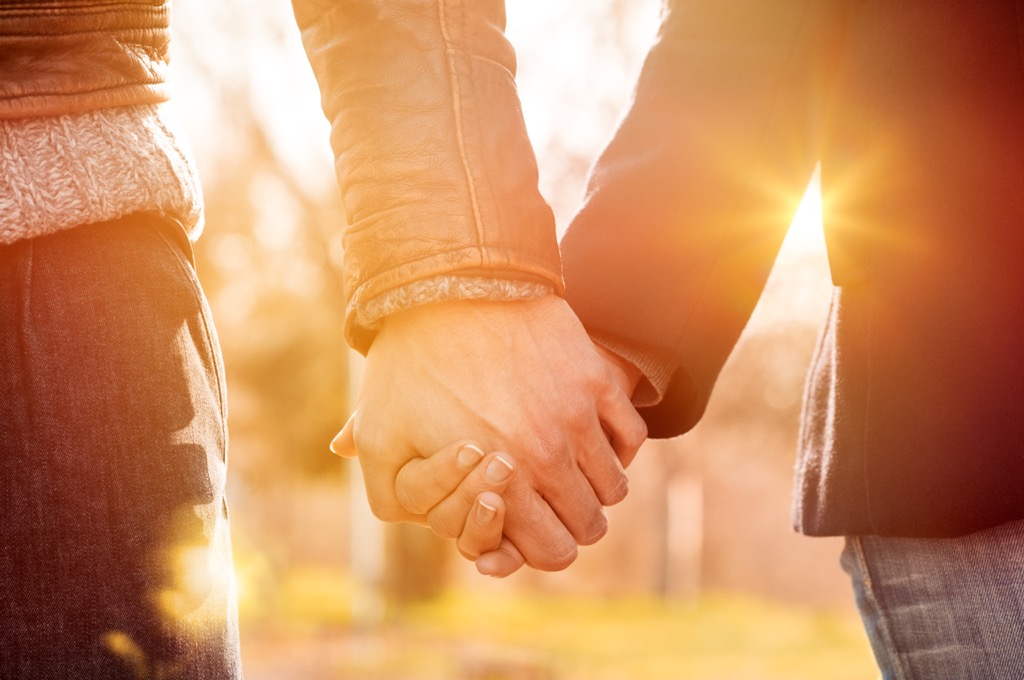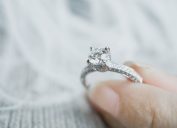My Wedding Ring Means A Lot to Me. But Here's Why I Don't Wear It.
I stripped the symbol of fidelity from my hand, but it's embedded in my heart, wedding ring or not.

By the time my husband proposed to me, an engagement ring should have been the least of my concerns. At that point, we were dealing with two small children, a bungalow overflowing with laundry and toys, difficult in-laws-to-be, and the prospect of a wedding I lacked both the energy and fortitude to plan.
But it was the ring that I obsessed over. During morning preschool, afternoon naps, and by the bedside lamp, I scrolled through diamond solitaires, each dissimilar to the naked eye. Princess cut, two carats, impeccable clarity, and a narrow platinum band, encouraged by a Tiffany jeweler "to better showcase the diamond."
When my ring finally arrived—plucked from its navy velvet lining and sliding down my ring finger with a "yes"—it was breathtaking. It was everything I could wish for in a ring: resilience, transcendence, conflict-free beauty. Come to think of it, those were the qualities I wished for in a marriage, too, all aglitter on my manicured finger.
This wasn't my first engagement ring either. It was my fourth. There had been other diamond rings on that finger, each a dazzling promise that I ultimately failed to keep.
My then-fiancé Michael didn't mind though. He didn't mind that I continually postponed the wedding and he didn't mind my singular focus on the ring—until the day I lost it. Even then, it wasn't the loss he minded (of course, it helped that it was fully insured); it was the metaphor.
"You lost your engagement ring at a wedding!" he hissed the next day as our eyes scraped the ground of the outdoor venue of the nuptials we'd just attended. We scoured the gravel lot for a telltale flare of light that never surfaced.
"You've backed out of multiple weddings. Was this some subconscious declaration? Is there something else you're trying to tell me?" he asked. No, it wasn't. And no, there hadn't been.
The ring—ordered to fit just right—had been fatally loosened with a few dropped pounds, an absurd casualty of my new fitness routine for our own wedding. We ordered a duplicate replacement: luminous, pure, assuringly snug. And with it, a matching wedding ring: an endless platinum circle of glittering diamonds.

After we got married, the dual rings took up permanent residence on my finger. They were gorgeous, brilliant reminders of my happy marriage, my doting husband, and our sworn promises to each other and ourselves. But they were also bothersome—they felt foreign on my jewelry-shunning body, and they soon became priceless worry stones I'd anxiously spin.
Still, I didn't dare remove my wedding rings: not to shower, not to work out, and certainly not to be seen in public amongst family and friends who might wrongly infer about the state of my union or total strangers who might question my marriageability. Did I care? Copiously. For decades, I'd worked hard, on relationships, on heartbreak and repair, on myself, and now, on this marriage—a fine one, one ineffably symbolized by precious metals and gems.
And then, five years into my marriage, my health collapsed thanks to an autoimmune disease that struck me with fatigue, gastrointestinal havoc, and thyroid failure. My always-slight frame was suddenly carrying an additional 25 pounds. The weight was an onus—not for my husband, who only ever saw the woman he married, a now-less-well woman doing her best—but it was a literal burden on me, a new density I found constricting.
To cope, I began to loosen everything in my life that suddenly pinched: a seatbelt, a life jacket, a dining chair drawn too close to a table, and yes, my wedding ring. Removing it and moving through the world without it felt like public nudity; worse, I worried that my husband—whose platinum band was perpetually in its place—might interpret its absence as a statement on our marriage.
Most of the women I looked up to were never seen without their wedding rings. No matter the precarious state of her own union, my mother was never without her plain gold band. My grandmother's ring—through various husbands—was also always in its place, even beneath yellow rubber cleaning gloves, gardening gloves, and oven mitts.
But my great-grandmother had offered an example of both a successful marriage and of sensible wedding ring appreciation. A Southern woman with bespoke fur coats, white leather luggage sets, elegant china, and crystal settings, Mimmie was deeply proud of her marriage to my great-grandfather, delighting in showcasing her wedding diamonds on a perpetually just-manicured hand. She was also a tireless doer, shedding her heels for boots to muck about in a pigsty, wrapping her freshly-set hair in a scarf to lop tree branches and overgrowth, and burying her hands in rising dough, fried chicken batter, and jellied berries readied for canning.
Through it all, a statue in her kitchen windowsill sported her dazzling wedding set. Her rings were a symbol of romance, but also of practicality.
There are rings, I realized, and there is also marriage.

Today—even months after shedding those pounds—my rings largely live in a pretty ceramic bowl with other delicate, precious items. Without them, I shape floured pastries, knead massage oil into my husband's shoulders, and run my fingers through my daughters' long hair. Not wearing them attunes me to their significance on others' hands, and what they may symbolize: union, fidelity, love, or perhaps none of these. Maybe the ring wearing is merely a habit. Or maybe they symbolize all of those things, with a spouse whose ring or rings signify the same.
My wedding rings mean many things to me, but they're no longer performative. I am the same spouse wearing a diamond band as I am without: loving, scrupulous, wholly committed to this marriage. While my husband's ring glows warmly on his left hand, he infers no subtext in my bare ring finger, instead embracing the certainty that not wearing them publicly means they're now a private, sacred treasure.
In removing my wedding rings, I may have stripped the symbols of fidelity from my hand, but they're embedded ineffably in my heart.





















